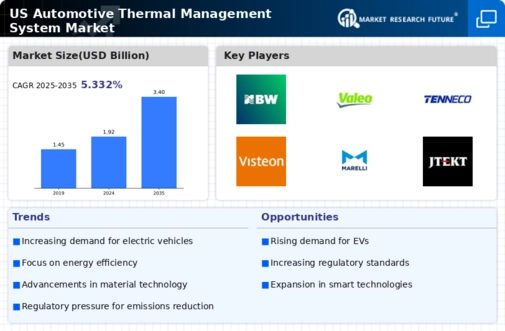Rising Demand for Electric Vehicles
The automotive battery-thermal-management-system market experiences a notable surge in demand due to the increasing adoption of electric vehicles (EVs) across the United States. As consumers become more environmentally conscious, the shift towards EVs is expected to accelerate. According to recent data, the EV market is projected to grow at a CAGR of approximately 25% through 2030. This growth necessitates advanced thermal management systems to ensure optimal battery performance and longevity. Effective thermal management is crucial for maintaining battery efficiency, safety, and overall vehicle performance. Consequently, manufacturers are investing in innovative thermal management solutions to meet the evolving needs of the automotive battery-thermal-management-system market, thereby enhancing the overall driving experience.
Consumer Awareness of Battery Safety
Consumer awareness regarding battery safety is becoming increasingly prominent, influencing the automotive battery-thermal-management-system market. As electric vehicles gain popularity, potential buyers are more informed about the risks associated with battery overheating and thermal runaway. This heightened awareness drives manufacturers to prioritize safety features in their thermal management systems. Effective thermal management is essential for preventing battery failures and ensuring consumer confidence in electric vehicles. Consequently, companies are investing in research and development to create advanced thermal management solutions that enhance battery safety. This focus on consumer safety is likely to shape the future of the automotive battery-thermal-management-system market, as manufacturers strive to meet the expectations of safety-conscious consumers.
Growth of Renewable Energy Integration
The integration of renewable energy sources into the automotive battery-thermal-management-system market is gaining traction. As the United States transitions towards sustainable energy solutions, the demand for energy storage systems is increasing. Electric vehicles equipped with advanced thermal management systems can effectively utilize renewable energy, such as solar or wind power, for charging. This synergy between renewable energy and electric vehicles presents a unique opportunity for the automotive battery-thermal-management-system market. By optimizing battery performance through effective thermal management, manufacturers can enhance the viability of electric vehicles as a sustainable transportation option. This trend suggests a promising future for the automotive battery-thermal-management-system market, as it aligns with broader efforts to promote renewable energy adoption.
Regulatory Pressure for Emission Reductions
The automotive battery-thermal-management-system market is significantly influenced by stringent regulatory frameworks aimed at reducing greenhouse gas emissions. In the United States, regulations such as the Corporate Average Fuel Economy (CAFE) standards compel automakers to enhance vehicle efficiency. As a result, there is a growing emphasis on developing advanced thermal management systems that can optimize battery performance while minimizing energy loss. The automotive industry is under pressure to comply with these regulations, which drives innovation in thermal management technologies. This regulatory landscape is likely to propel investments in the automotive battery-thermal-management-system market, as manufacturers seek to align their products with environmental standards and consumer expectations.
Technological Advancements in Battery Design
Technological advancements in battery design are reshaping the automotive battery-thermal-management-system market. Innovations such as solid-state batteries and improved lithium-ion technologies are emerging, offering higher energy densities and enhanced safety features. These advancements necessitate sophisticated thermal management solutions to address the unique challenges posed by new battery chemistries. For instance, solid-state batteries operate at different temperature ranges compared to traditional lithium-ion batteries, requiring tailored thermal management strategies. As manufacturers strive to integrate these advanced battery technologies into their vehicles, the demand for effective thermal management systems is expected to rise. This trend indicates a dynamic shift in the automotive battery-thermal-management-system market, as companies adapt to the evolving landscape of battery technology.
















